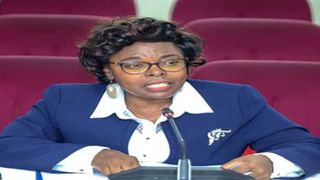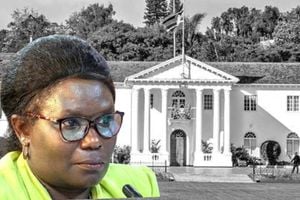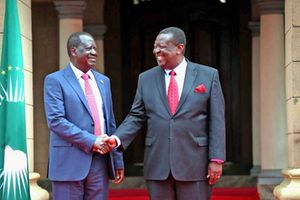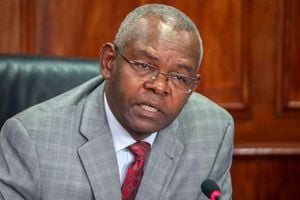
Controller of Budget Dr Margaret Nyakango when she appeared before the Public Investments and Special Funds Committee at KICC, Nairobi on July 3, 2023.
| File | Nation Media GroupNews
Premium
Kenya paid Sh2bn for loans it never got, says Nyakang’o
Taxpayers paid Sh1.89 billion as commitment fees between July 2022 and September 2023 for loans that have never been disbursed to the country, Controller of Budget Margaret Nyakang’o has revealed.
Dr Nyakang’o, speaking while appearing before the National Assembly Committee on Public Debt and Privatisation, said the amount includes Sh499 million external loans repayments.
A commitment fee is a banking term for a fee charged by a lender to a borrower to compensate the lender for its commitment to put up the loan funds.
Commitment fees are typically associated with unused credit lines or undisbursed loans.
The lender is compensated for providing access to a potential loan because it has set aside the funds for the borrower and can't yet charge interest.
Dr Nyakang’o told the MPs that there is need for the National Treasury to be transparent in the management of the Consolidated Fund Services (CFS) expenditures. She said the Treasury should publish more information about CFS spending such as breakdown of costs and debt-funded projects.
“There should be an explanation on why CFS budget relating to salaries, allowances and miscellaneous service is significantly inflated in the original estimates then later revised downwards,” Dr Nyakang’o said
Kitui Central MP Makali Mulu said there is need to establish where the money which Kenyans paid as commitment fees for every month has gone.
“We actually need to know as a country where this money that we have never taken or utilised is yet we are paying a commitment fee. We are shocked that some of these loans have been there as far back as 10 years,” Dr Makali said.
She pointed out that, for effective budget implementation, taxation should go hand in hand with a reduction in borrowing and fiscal consolidation.
“Considering the current public debt levels, new public borrowing should only be undertaken for projects that will positively impact the national budget,” Dr Nyakang’o told MPs.
Dr Nyakang’o stressed the need for a review of government accounting policies to ensure accurate recording of public debt that matches the borrowed funds to the relevant projects.
She called on Treasury to review some of the policies of the International Monetary Fund (IMF), saying, most have a negative impact on the country’s budget implementation and the economy.
“The National Treasury should conduct a thorough review of these policies to protect the economy from the negative impact,” Dr Nyakang’o said.
The Controller of Budget also warned that the pension wage Bill has been increasing, which, she said, poses a risk to the growth of the economy.
Documents tabled before the committee indicate that, in the period between July and November 2023, the cumulative expenditure was Sh44.73 billion.
“Adequate measures should be taken to fast-track pension and gratuities conversion from defined benefit to defined contribution,” Dr Nyakang’o said.
In a bid to effectively manage the high cost of external debt service, Dr Nyakang’o said the government needs to review the current borrowing policy to develop measures to ensure public debt sustainability is maintained in the medium-term to long term.
In addition, she said, the government should consider public debt restructuring and engage with bilateral creditors in order to review debt repayment terms.





